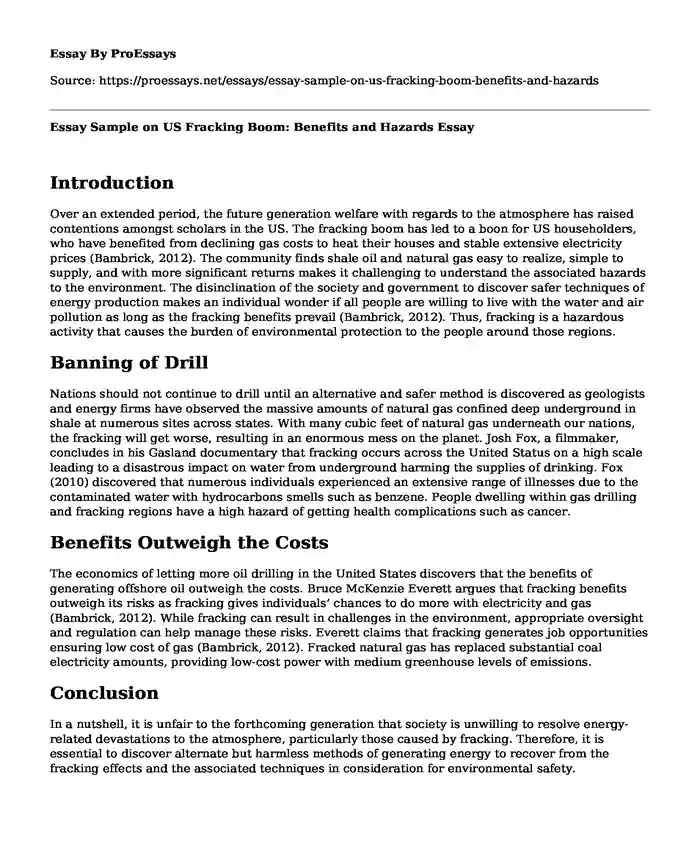Introduction
Over an extended period, the future generation welfare with regards to the atmosphere has raised contentions amongst scholars in the US. The fracking boom has led to a boon for US householders, who have benefited from declining gas costs to heat their houses and stable extensive electricity prices (Bambrick, 2012). The community finds shale oil and natural gas easy to realize, simple to supply, and with more significant returns makes it challenging to understand the associated hazards to the environment. The disinclination of the society and government to discover safer techniques of energy production makes an individual wonder if all people are willing to live with the water and air pollution as long as the fracking benefits prevail (Bambrick, 2012). Thus, fracking is a hazardous activity that causes the burden of environmental protection to the people around those regions.
Banning of Drill
Nations should not continue to drill until an alternative and safer method is discovered as geologists and energy firms have observed the massive amounts of natural gas confined deep underground in shale at numerous sites across states. With many cubic feet of natural gas underneath our nations, the fracking will get worse, resulting in an enormous mess on the planet. Josh Fox, a filmmaker, concludes in his Gasland documentary that fracking occurs across the United Status on a high scale leading to a disastrous impact on water from underground harming the supplies of drinking. Fox (2010) discovered that numerous individuals experienced an extensive range of illnesses due to the contaminated water with hydrocarbons smells such as benzene. People dwelling within gas drilling and fracking regions have a high hazard of getting health complications such as cancer.
Benefits Outweigh the Costs
The economics of letting more oil drilling in the United States discovers that the benefits of generating offshore oil outweigh the costs. Bruce McKenzie Everett argues that fracking benefits outweigh its risks as fracking gives individuals’ chances to do more with electricity and gas (Bambrick, 2012). While fracking can result in challenges in the environment, appropriate oversight and regulation can help manage these risks. Everett claims that fracking generates job opportunities ensuring low cost of gas (Bambrick, 2012). Fracked natural gas has replaced substantial coal electricity amounts, providing low-cost power with medium greenhouse levels of emissions.
Conclusion
In a nutshell, it is unfair to the forthcoming generation that society is unwilling to resolve energy-related devastations to the atmosphere, particularly those caused by fracking. Therefore, it is essential to discover alternate but harmless methods of generating energy to recover from the fracking effects and the associated techniques in consideration for environmental safety.
References
Bambrick, G. (2012). Fracking: Pro and Con. Accessed at: http://now.tufts.edu/articles/fracking-pro-and-con
Josh Fox. (2010). Gasland. http://watchdocumentaries.com/gasland/
Cite this page
Essay Sample on US Fracking Boom: Benefits and Hazards. (2023, Sep 17). Retrieved from https://proessays.net/essays/essay-sample-on-us-fracking-boom-benefits-and-hazards
If you are the original author of this essay and no longer wish to have it published on the ProEssays website, please click below to request its removal:
- Essay on Ecology Issue: Energy Conservation
- Do Cell Phones Cause Cancer?
- Alternative Types of Energy That Can Help to Preserve Earth Natural Resourcesa
- Improve the World Essay
- Protecting Nature: Challenges of Conservation Ethics - Essay Sample
- Climate Change: Impact on Global Poverty Levels - Essay Sample
- Essay on Digital Nursing Innovations: Prioritizing Care Through Leadership & Simulation







